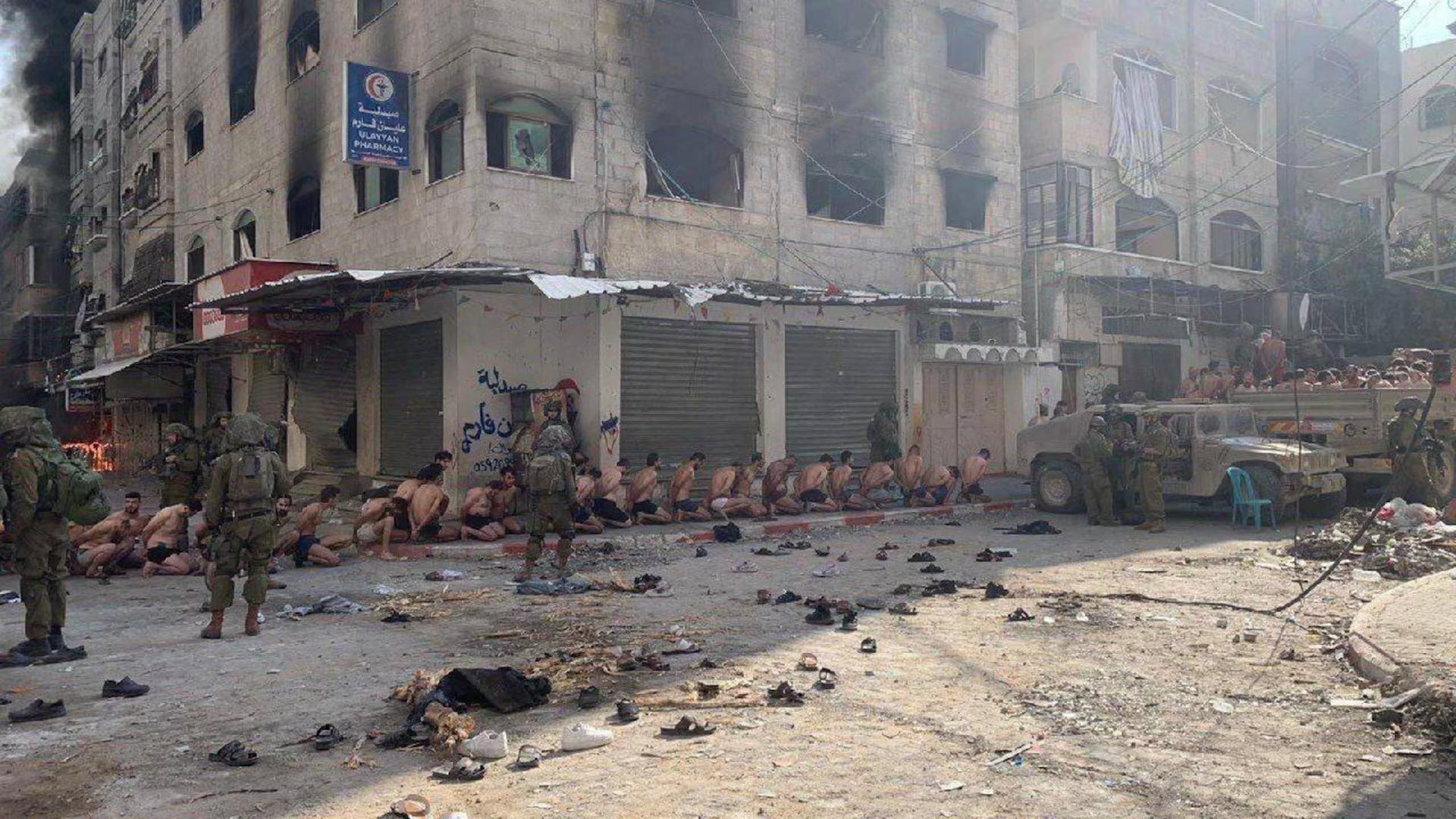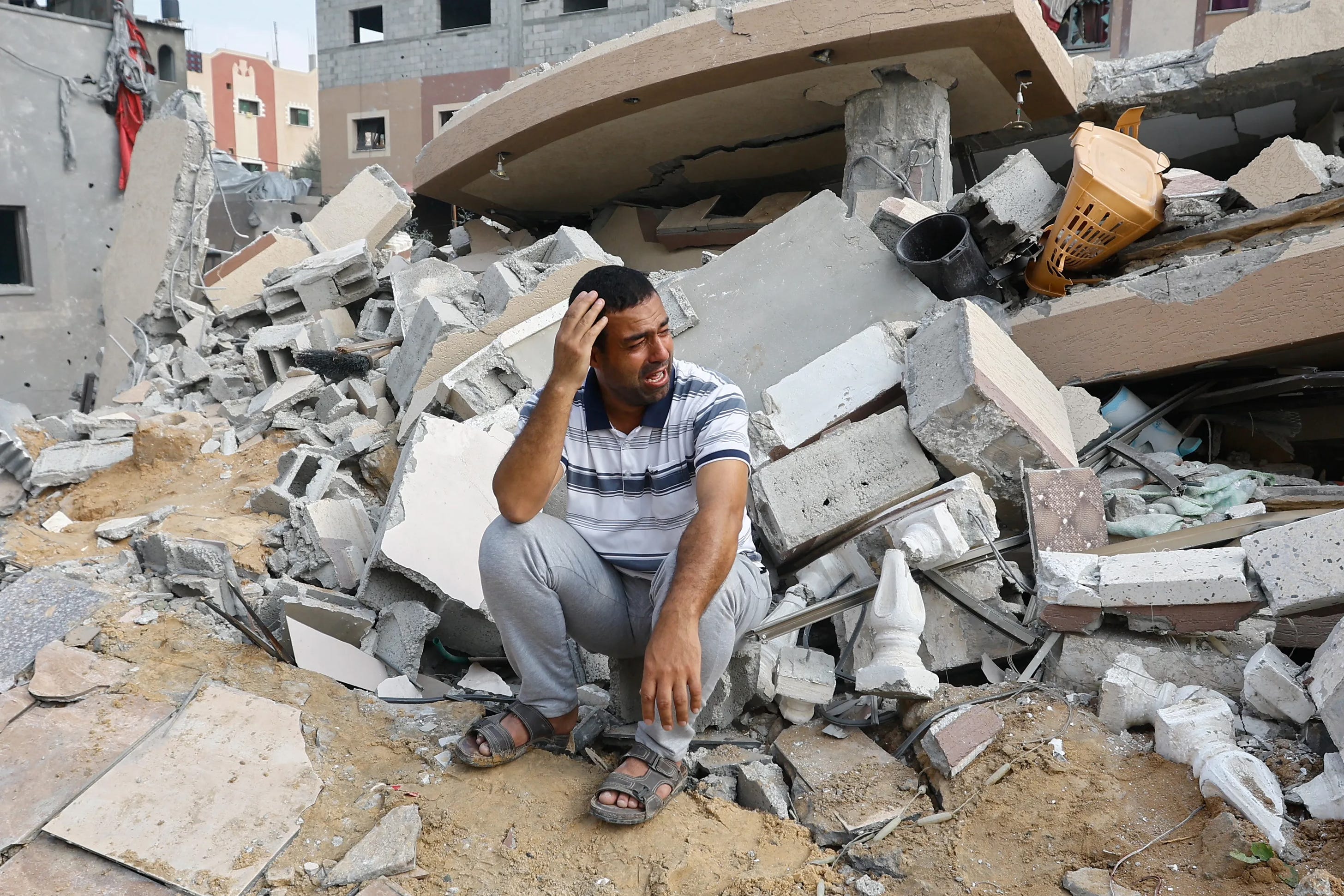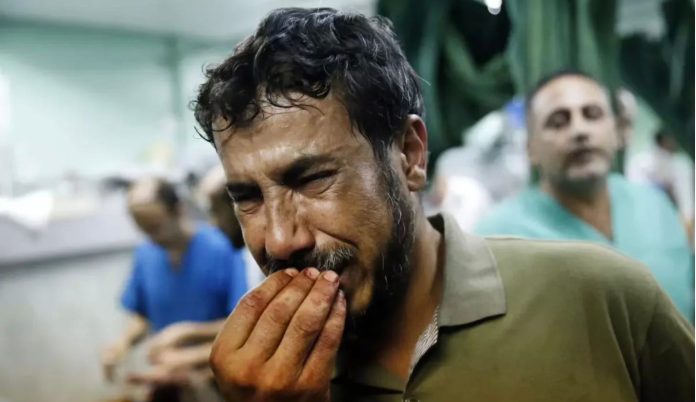On the Western erasure of Palestinian men’s lives and dignity.
Reader discretion advised. Some images may be disturbing for some readers.
By Frederick Joseph — Today is Father’s Day, a time when many celebrate the men who have guided them, loved them, and made sacrifices for their futures. Fittingly, June is also Men’s Mental Health Month, a period dedicated to raising awareness about the often overlooked struggles that men endure. As these two observances converge, I find myself compelled to address a topic that has weighed heavily on my mind for months.
As with all things in this world, dualities exist. It is true that men often manifest oppressive behaviors—I, too, have been guilty of this at various points of my own manhood. Yet, to be oppressive is not the entirety of what a man is or must be. Our society, however, has done little to grasp this complexity, the idea that men can be multifaceted beings, beyond our capacity for harm or our benefits from patriarchal structures.

The reality is that in a patriarchal society, men hold immense power and cause immense harm, often to women. The narrative is well known and oft-repeated: men are the wielders of dominance, the purveyors of violence, the agents of a system designed to subjugate. But there is another aspect of patriarchy we don’t discuss enough, and that’s how patriarchy doesn’t benefit men outside of power. It dilutes humanity and drills men down to existing solely to cause harm and have their minds, bodies, spirits, and emotions sacrificed at the altar of said patriarchal powers.
Patriarchy’s promise to men is a deal with the devil: power in exchange for the relinquishment of full humanity. The traditional roles it prescribes are suffocating, leaving little room for vulnerability, compassion, or emotional nuance. In this system, a man is a vessel for strength, aggression, and stoicism, stripped of the softer, more detailed parts of his identity. This reduction is not a privilege; it is a form of spiritual impoverishment—and creates a societal apathy for our pain.
As a Black man in America, I am all too familiar with this apathy. How it has reduced my manhood to being a threat, an instrument of desire, or a statistic in a tally of bodies.
I believe this lack of apathy is starkly evident in the narrative surrounding Palestinian men. As it has become obvious that most of the media and individuals discussing the atrocities in Gaza believe Palestinian men suffering and being killed are worth less humanity than the women and children they are dying beside.

A few months ago, I watched a grim spectacle unfold on my cellphone screen. A video on social media showed IDF soldiers parading Palestinian men through the streets, while they were stripped down to their underwear. Israel’s claim was that they were members of Hamas. This was swiftly disproved when civilians and a journalist were identified among the captives. But whether they were Hamas or not seemed a secondary matter in the face of the image’s brutality.
The question that sat with me was this: why was there not more public outrage? To take lives is one horror, but to strip these men of their dignity, to parade them like chattel, is another layer of cruelty. I wondered at the silence, at the lack of uproar. Was it fatigue? Was it fear? Or was it the numbing effect of prolonged conflict that had dulled the senses of those who watched from afar?
The image of those men, shivering in their vulnerability, reduced to a spectacle of shame, haunted me.
In the weeks that followed, I grappled with the absence of outrage over that harrowing video. I turned a critical eye toward the conversations, headlines, and social media posts concerning the lives, deaths, and existence of Palestinian men. What I uncovered did not surprise me, yet it devastated me nonetheless. The Western framing of loss in Gaza tends to focus on Palestinian women and children, their innocence and vulnerability making for a more compelling story. They are portrayed as the ultimate victims of a conflict that shows no mercy. Meanwhile, in info graphics, articles, and pleas on social media for an end to genocide, there is very little mention of the men also laid low and clamoring for hope.
Why is their presence erased in the telling of these tragedies? Are they not people too?
This dehumanization is no accident. Since 9/11, there has been a relentless campaign to strip Palestinian, Arab, Muslim, and Brown people, often specifically men, of their humanity. This effort has only intensified since the Hamas attack in Israel on October 7th.
In the Western imagination, deeply entrenched racist constructs have long depicted Palestinian men as savages, terrorists, and sexual predators. This narrative serves a strategic purpose, enabling Zionist narratives to cast the events such as October 7th solely as an affront against women. A mass rape, despite a glaring lack of eyewitness testimony or forensic evidence. Such portrayals are not merely hyperbolic; they are dangerous fictions that have compelled major media outlets, including the New York Times, and even President Joe Biden, to walk back statements that were largely fear mongering Israeli propaganda.
This skewed depiction stands in stark contrast to the actual, documented instances of widespread sexual violence and torture perpetrated against Palestinians, including men.
Conflict-related sexual violence (CRSV) against men and boys remains shrouded in a silence as thick as it is deadly. In the shadowy corners of war, these atrocities are not merely overlooked; they are systematically ignored, seldom acknowledged as the war crimes they are. This neglect perpetuates harmful gender norms that cast women as the sole victims of such violence. Yet, amidst the ongoing genocide in Gaza, CRSV is a grim reality.
Since October 7, over thousands of Palestinians—men, women, and children—have been detained in Gaza. The United Nations reported in March that among the released detainees, 872 men and 26 boys, recounted tales of brutal beatings, prolonged stress positions, and sexual assault. One man described being forced to sit on an electrical probe, causing severe burns to his anus, while others spoke of beatings to the genitals and invasive groping.
The cruelty inflicted on Palestinian detainees at the Sde Teiman military base in the Negev desert, detailed in a leaked report from CNN via Israeli whistleblowers, paints an even grimmer picture. Dr. Mohammed al-Ran, head of the surgical unit at Gaza’s Indonesian Hospital, recounted his ordeal after being detained. Blindfolded, stripped, and piled on top of nearly naked men, Dr. al-Ran was often forced to witness the torture of others.
This sort of sexual violence inflicted upon Palestinian men is part of a long-standing history of brutality and dehumanization. This violence, deeply embedded in the fabric of the occupation, stretches back decades, forming a continuity of suffering.
Historically, occupying forces have employed sexual violence as a weapon of war—a deliberate strategy to terrorize and control. In Palestine, this strategy manifests in a pattern of abuse designed to strip individuals of their dignity and humanity. Reports from as far back as the early days of the Israeli occupation document similar horrors, with countless men subjected to sexual humiliation, assault, and torture.
In July 2023 a report released by Save the Children showed that 69 percent of Palestinian children have been involuntarily stripped and searched by the Israeli military; some reported abuse of a sexual nature.
In the 1980s, during the First Intifada (a sustained series of protests and uprisings carried out by Palestinians in the Israeli-occupied Palestinian territories and Israel), Palestinian detainees told stories of sexual violence and abuse at the hands of Israeli soldiers and interrogators. These accounts mirrored those of more recent times: forced nudity, genital torture, and rape used as tools to break the spirit and instill fear. The goal was, and is, clear—to dominate and subjugate a population by attacking the core of their identity and humanity.
These practices persisted through the Second Intifada in the early 2000s and continue unabated today. Despite international human rights organizations documenting these abuses, the perpetrators often face little to no accountability. The cycle of violence remains unbroken, and the silence surrounding these crimes perpetuates their occurrence.
This historical context is crucial. It reveals that the violence inflicted on Palestinian men is not an aberration but a consistent and systemic feature of the occupation. Yet, silence around this brutality is maddening, and lays bare a clear understanding that Palestinian men don’t matter to many.
I often try to imagine the stillness in the air when I see photos of Palestinian men standing in bombed-out places that were once their homes. The air must be heavy with dust and the remnants of a life that once thrived there. These men, with their eyes etched with pain and their shoulders burdened by loss, stand as silent witnesses to a destruction that the world views through a skewed lens.
These men, fathers, brothers, sons, and husbands, are often reduced to mere shadows in the narrative of war. But in this selective empathy we dismantle our own humanity—and any chance at liberation.
None of this is to say that the genocide destroying the lives of Palestinian women and children shouldn’t be discussed, as 70% of those killed in this genocide have belonged to that group. But the question everyone should ask themselves is why is there a strategic effort to erase men from the narrative. As if these men dying is normal. As if in our society these men are simply supposed to die.
To understand that Palestinian men are victims too is to understand them as humans too. This understanding disrupts the carefully constructed narrative that seeks to strip them of their essence, a narrative rooted deeply in bigotry. Recognizing Palestinian men as victims requires a fundamental shift in perception, one that acknowledges their pain, their suffering, and their dignity. This shift is not merely an act of empathy but a profound act of reclamation.
By portraying Palestinian men as inherently violent or dangerous, the United States and Israeli machinery of occupation finds a convenient scapegoat, a way to rationalize brutality and silence dissent.
This is why it’s so important to understand these men as fathers who love their children, sons who mourn their parents, brothers who support their siblings, and friends who cherish their relationships. Why it is so important to see their tears, their laughter, their dreams, and their nightmares. Why it is so important to see them as more than people born just to die.
Liberating the Palestinian people cannot be achieved without this recognition. The liberation of a people is not merely a physical or political act; it is an honoring of identity, of narrative, and of humanity. It is about reclaiming the stories that have been silenced, the voices that have been drowned out, and the humanity that has been denied. It is about affirming that Palestinian men, like all people, possess an intrinsic worth that cannot be negated by propaganda or imperialism.
The stories of these men, broken but unbowed, demand to be told. They force us to confront the uncomfortable truth: the narrative of suffering in Gaza is incomplete without acknowledging the lives and losses of Palestinian men.






